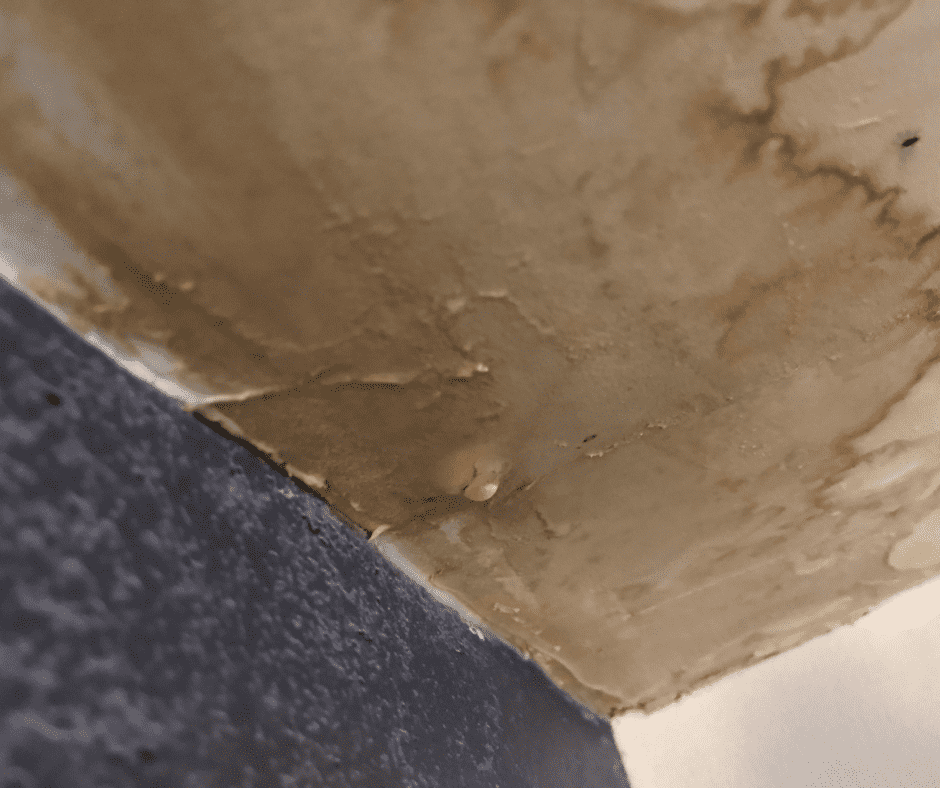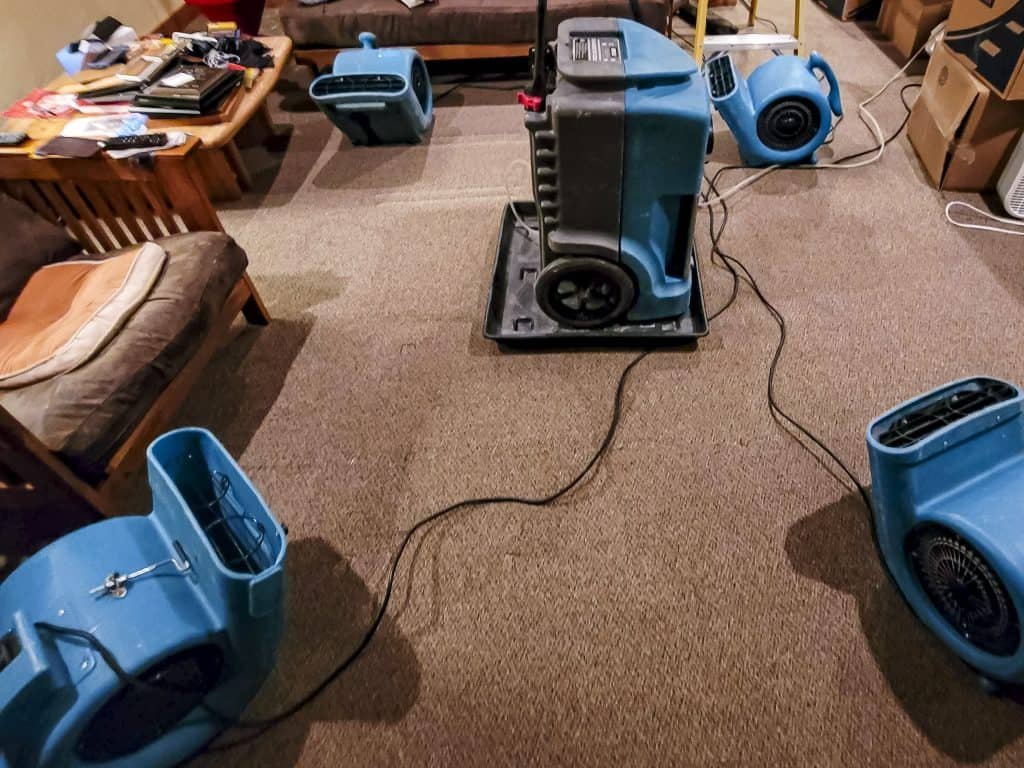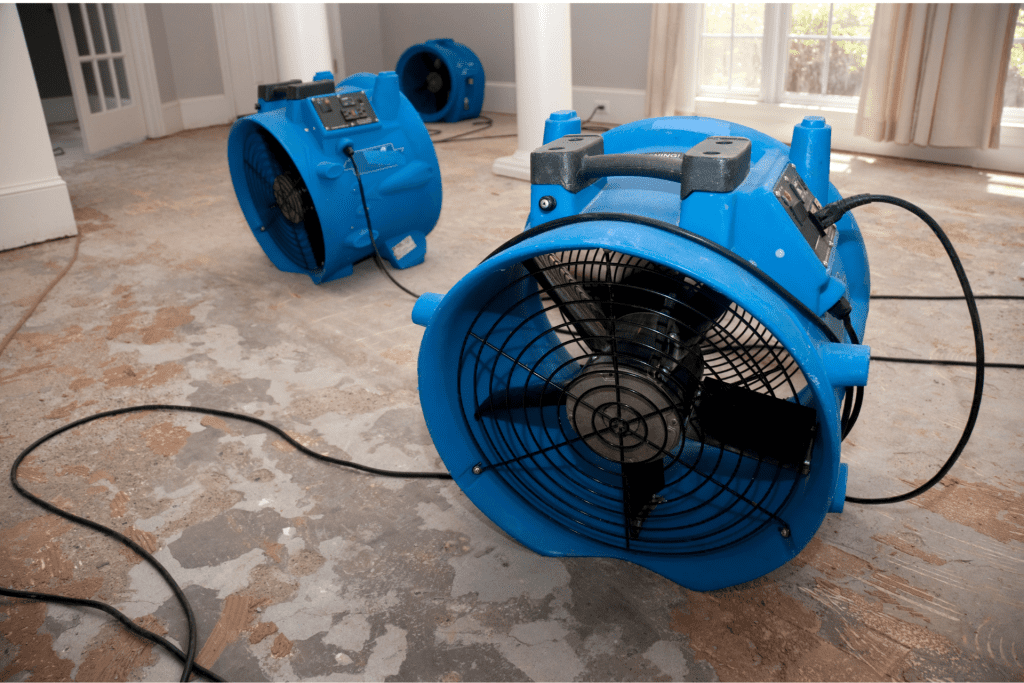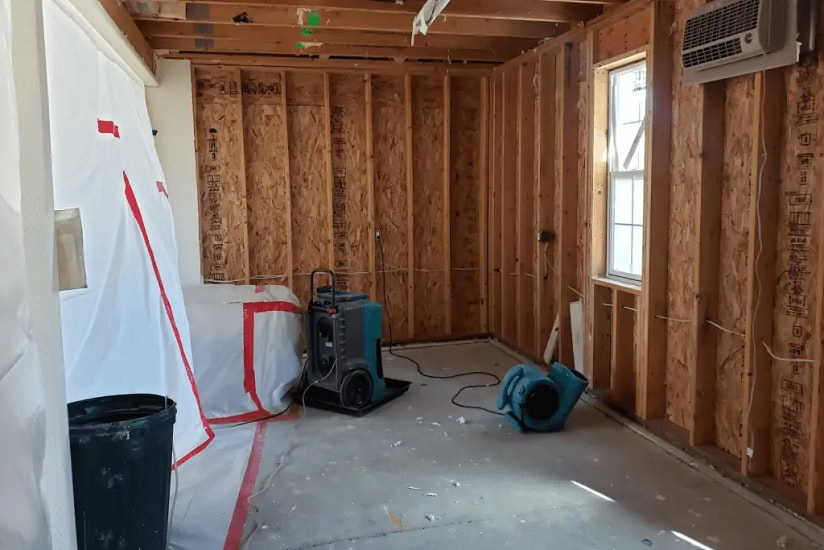Is Mold From Water Damage HarmfulThat musty smell is not just coming from nowhere. Usually, when you have that musty odor around your house, especially after you’ve experienced a water damage event, it means that you’ve got mold. This article will answer the question – is mold from water damage harmful. But let’s first start with the basics.  What is mold?What is mold? Mold is a microscopic organism that digests organic matter and reproduces by releasing spores. Molds are one of over 5,000 types of fungi. In nature, mold helps decompose leaves, wood and other plant debris. The problem occurs when mold enters our home and begins digesting our walls, floors, etc. How does mold grow in my home?Mold enters your home as tiny spores, and these tiny spores require moisture to grow. As they grow, they digest your home and destroy it. Give them a nice place to live and you will have mold. Almost any surface will do: walls, carpets, ceiling tiles, wallpaper, sheet rock, insulation, and even paint! All that is required for mold to grow is a suitable environment. What is mold in your home, other than an unwelcome guest! There is no way to keep all mold spores out of your home, but you can control the growth of mold by keeping your home dry. In some areas this is rather difficult, but with the right know-how it can be done. How are people exposed to molds?When molds are disturbed, they release spores into the air. Often this occurs when people are cleaning up mold. The mold spores are released into the air and inhaled into the lungs. Many people report headaches and runny noses after just a little bit of exposure to mold spores. Contact with the skin is another way to be exposed to mold spores. This can happen through touching moldy items, eating moldy food or incidental hand to mouth contact. Is exposure to mold dangerous?For healthy people mold is not harmful. However, for people with asthma, or who have allergies, mold can pose a health threat. The reaction to mold may be eye irritation, skin rash, nasal congestion, runny nose, and difficulty breathing. For those with asthma the risks can be magnified. For some people mold spores can trigger an asthma attack. Certain molds produce toxins called mycotoxins. When people are exposed to high levels of mold mycotoxins, they may experience headaches, nausea, fatigue, and eye and lung irritation. If you suspect that your symptoms are caused by mold exposure, you should see a physician. How to deal with mold after water damage?We’ve described some techniques you could apply to remove mold in our article on how to deal with water damage. So, check that article out for in-depth tips. Other than that, the only advice we could give you is to seek assistance from a professional mold removal company in Portland. Professionals will come in with protective clothing, decontamination equipment, the right cleaning supplies, and, most importantly, skills and proper techniques. When it comes to water damage, Precise Water Damage Restoration of Portland can help you. If you have water damage Portland OR residents frequently struggle with, especially during the rainy days, call us and we’ll help you remove the water. Having that said, if you wish to learn more about how does water damage restoration work and is water damage covered by insurance in Portland, feel free to check out our other posts on this blog! The post Is Mold From Water Damage Harmful appeared first on Water Damage Restoration Portland OR. via Water Damage Restoration Portland OR https://waterdamageportlandor.com/is-mold-from-water-damage-harmful/
0 Comments
What To Do When Your Basement Is FloodedWhen your basement is flooded you can feel so desperate and not know what to do. But you need to do something, otherwise you will have a soaked up carpet, water stains all over, mold and mildew growing and giving off nasty odors, and you might even need to repair a crack in the foundation. Water damage is serious. Early spring is a favorite time for the basement to flood, for a variety of reasons. Some of our regular clients would have extensive basement flooding every few years, even though they had taken extensive measures to prevent it. Ice build-up in the spring can prevent water from soaking into the ground. If it rains heavily on top of this ice barrier (and we all know Portland can get pretty wet), you will almost certainly get some carpet, wood, or even foundation water damage. The problem can come from both sides of the house, and it can be very difficult to permanently repair. As a consequence, you may have to use high quality basement floor paint after things settle down. This will help prevent the growth of mold and mildew. If you do nothing, it is almost certain that your house will suffer from mold infestation, which is very unhealthy. Obviously, when you have water in the basement, you need to stop the source as soon as possible. Once this is taken care of, you can address the damage and find a way to prevent it from happening again. We’ll help you with this. The main thing to have in mind is that more severe cases will almost definitely require a professional to deal with your situation. It may be just too difficult and risky for you to DIY. Anyway, knowing about the following subjects will certainly help you, regardless of the route you take. Here’s What You Will Learn:
Let’s start!  French DrainsA good solution is to use French drains around the foundation. This is an inexpensive and simple solution to a big problem. You can do this yourself, though you need to consider how much time and strength you have to put in. It does involve a lot of shallow digging, and some grunt work, but it is really not that hard. The drain runs the perimeter of the house and can effectively stop a great deal of basement flooding. The water just does not have a chance to get past the French drains. This was the solution in one of our team members’ friend’s cases and his water damage in the basement stopped completely. His total investment was very minimal, and he even enjoyed the physical work. He said: “I even used some cave-man technology to move some very heavy stones, using pipes and boards.” Foundation CracksIf you have a foundation crack from the water, take care of it ASAP. These cracks only get worse with time. Once they reach a certain size, they tend to get bigger very quickly. You many need to do some excavating to take the pressure off the wall before you can fix it. A patch will do almost nothing, because the cause is still there. Foundation damage can outgrow your DIY capabilities very quickly. You’ll likely require professional assistance with this. Carpet DamageUnfortunately, you most likely will need to get rid of the carpet if it has a lot of water damage. You can try to simply hang it outside in the sun for several days to see if the water evaporates and there is no mold or mildew. If there is, you can try some commercial applications, such as the ones you find at a hardware store, or carpet store. Ammonia and water could work for you. Basement Water Damage Restoration Portland ORAll of this sounds like too much work? Or even dangerous? It’s because it is. Basement water damage is a hard issue to fix and you’ll likely need a professional to help you out. For basement water damage restoration in Portland, OR, call Precise Water Damage Restoration of Portland now. Besides basement water damage, we can help you with: More helpful articles:
Call us now at +1 (971) 299-2417! The post What To Do When Your Basement Is Flooded appeared first on Water Damage Restoration Portland OR. via Water Damage Restoration Portland OR https://waterdamageportlandor.com/what-to-do-when-your-basement-is-flooded/ Tips to Deal with Water Damage at Your HomeWater is an important part of our daily life but sometimes, it brings huge damage to a home in Portland. It can cause all kinds of problems for households, both in the long run and immediately after the damage. From leaky faucets to floods, water damage can cause major safety and health problems, and it can really be a serious threat. Follow these water damage cleanup tips to repair and stop water damage at home. Content Table:
Let’s get right into it!  Fixing Up Water DamageStop the Flow of WaterIf water heater failure or burst pipe caused flooding at your home, shut the main line off. If you don’t know the source of water leakage, call the water damage restoration expert. Turn Off the Power SupplyTurn off the gas and power supply immediately when your home is flooded. In case of heavy floods, turn the power off for safety, though it is not necessary for small leaks. Unless you are insulated well, don’t touch electrical appliances. Ask the electrician if you have to turn off the main line or stand in water. Inspect the DamageBefore you start to cleanup, find out if rebuilding is important. Take enough pictures and prepare the documents to present to insurance. More on this later. Rescue the ValuablesIf possible, find and rescue the most valuable items from the affected area, including money, jewelry, heirlooms etc. Remember, you don’t have enough time extracting and removing all the items, as water is still damaging your property. Remove the Standing WaterThe longer the water stays, the more damage you will face. Pump out the standing water. If it’s natural flood, wait for it to pump out until water moves away from your house. Don’t forget to wear safety gear like gloves, rubber boots, and respirator or mask. Keep pets and children away from flood water as it is contaminated. Put the pump at lowest spot of the floor. If water is deep, be sure to lower the pump with nylon rope. In case flooding is small, you may remove the water with wet-dry soap vacuum. It holds only 4 to 5 gallons (around 15 to 18 liters). Stay on high alert as flood water may have left nails and other sharp materials behind. Mud also contains huge amount of toxins. Remove all the mud and spray your walls down using clean water. Look for mud in air ducts. Rats and snakes may seek shelter in the flooded area. Never use any outlets or appliances until they’ve had enough time to dry out totally. Removing Mold/MildewFind the Mold – It can grow and be seen in crawlspaces, air ducts, between walls and rafters. If mold is not found, you may feel a musty smell. It must be mold growth which is not seen. Remove the Moisture Right Away – When signs of water damage like mold and mildew are found, you will want to act quickly. Mold and mildew develop within just 24 to 48 hours of moisture exposure. It will keep on growing until moisture is removed and mold is eliminated. Shut the Power Off – If you find any moldy or wet wiring or cables, turn the supply off before you start cleaning. Before turning it back on, examine the wiring with the help of electrician. Dry Out Wet/Moldy AreaDry out the moldy or wet area right away to keep any mold from building up. The longer an area is left wet, the more likely the mold can form. Open windows if humidity is low outside. You may turn the fan on but only when mold is not growing as fans can also spread the spores of mold. Remove all the wet carpets, toys, furniture etc. from area. Throw all the contaminated food items away. If wall has been damaged by flood, all the wet material must be removed, such as wooden products, insulation and any porous material. Prevent Mold from SpreadingIf you are facing huge amount of mold growth, be sure to hire professional cleaners. When being cleaned, mold is very dangerous as disturbing it can release spores. Be sure that the area is well ventilated. Wear mask, gloves, eye protection and respirator. Clean Solid Surfaces – Be sure to wash off the hard materials like solid wood, metal, glass and plastic with hot water and non-ammonia soap. On rough surfaces like concrete, use stiff brush. Remove any standing water with wet-dry vacuum. Clean the surface with 10% bleach liquid and disinfect it. Let the solution to dry for around 10 minutes and clean it with water. Clean Up Porous Items – Clean all the porous materials like clothing, upholstered furniture, rugs, bedding, books and others. Clean the material and disinfect with cleaner. Find out if any odor or fungus grows after few days of cleaning. Discard the item if mold returns back. Stop Cleaning If Mold Exposure Causes Allergy – If you start feeling allergic symptoms due to mold exposure, stop cleaning right away and call the professional cleaners. Some of the common signs of allergy are hacking cough, breathing problems like wheezing, sinus congestion, redness, eye irritation, rashes/hives, bloody nose, memory loss, headaches etc. File a ClaimThe sooner you contact the insurance agent, the sooner you can process your claim. The protection of your property relies on your coverage. It is important for an insurance agent to start the process. This way, you should list all the damaged property before you start the cleanup process. Use video evidence and pictures, if possible. Also tell the agent when you are throwing off health hazards like contaminated food as you can claim it too. Ask if you have to keep the samples of damaged items like piece of rug. Don’t forget to store all the receipts safely during the cleanup process. Secure the receipts of any services you hire and all the supplies. You may have to stay at the motel for nights when it is not possible to stay at home. Even those bills count in the claim process. Water Damage Repair Portland OregonSounds like a lot of work? It’s because it is. There is a reason why water damage restoration is a big business – a ton of work to do, many health risks, multiple parties involved, and there’s also a lot of equipment one has to manage. It’s not easy. And we’ve not even mentioned that you have to be able to do all of this late at night or during the weekend, at times you’re typically resting. If you feel like you can DIY successfully, great! Good luck. But chances are, most of you out there will struggle. And that’s okay. This is the reason why Precise Water Damage Restoration of Portland is here. If you require emergency services and want only the best water damage repair Portland Oregon has to offer, call us! We can also help with:
More helpful articles: The post Tips to Deal with Water Damage at Your Home appeared first on Water Damage Restoration Portland OR. via Water Damage Restoration Portland OR https://waterdamageportlandor.com/tips-to-deal-with-water-damage-at-your-home/ How Does Water Damage Restoration WorkBefore you hire us to repair your water damage in Portland, OR, you might be interested in how the whole water damage restoration process will look like. We completely understand why you would want to know that first, so let us quickly explain how everything will work. In a Hurry? Here Are Quick Points to Take Away:
Need more clarity? Keep on reading! Water Damage Restoration StepsLet’s cover each water damage restoration step one-by-one. Moisture Source RemovalTo start dealing with all standing water, we first have to prevent additional water from entering the property. This may or may not have already been done by the homeowner. At times removing a moisture source is easy and straightforward – there’s a pipe burst, we fix that, and the moisture source has been removed – but at other times, it might not be. At times water damage might be brought on by an external force like a flood or a hurricane, leading to a much more difficult job at our hands. In other cases, a homeowner could be experiencing a sewage backup that’s also very difficult to deal with. Sewage backups are often caused by tree roots and also bad weather. It all depends on the scenario but this is usually not a difficult step. Water RemovalWater removal is the next step. All that standing water in your property will only cause problems the longer it stays there, hence why we need to act fast and remove it ASAP. We’ll use pumps to extract the water out of your house or business to a specific location (don’t worry, the water will be in a controlled environment). Once the water is removed, all wet materials should also be taken out. We’ll work together to see what’s recoverable and what’s not but generally wooden furniture and items like paper, clothing, and electronic devices can be recovered, while food, medicine, and warped materials – which is often drywall (depending on how wet it is) – should be removed. DehumidificationDehumidification is done using professional dehumidifiers which most homeowners do not possess. This is why leaving water damage restoration to a professional is crucial – not only do we have the skills required for the job, but we also have the equipment you likely don’t. And rightfully so, it’s costly. Anyway, the drying process we and other restoration companies implement is not random. In fact, professional drying techniques are actually based on science. Check psychrometrics to learn more. Dehumidification needs to be done quickly in order to prevent mold from growing. Mold starts growing only 24 to 48 hours after water damage and it just means more trouble – and more mold removal expenses – which is why fast dehumidification is so critical. Additionally, we’ll begin the cleanup and disinfection as soon as all wet and potentially contaminated water and items have been taken out. If you’re wondering about timelines, it takes 2-3 weeks to dry most homes, depending on the severity of the damage. RepairsSome restoration jobs might not require as much repairs and reconstruction as others, but it’s very important to replace walls and flooring that have been severely damaged. For example, drywall should be removed and replaced if it’s only more than 1% wet. Flooring might be saved but only if we act quickly. As you’ve probably seen so far, the success of the entire project depends on speed, among other things. Hire a Professional Portland Water Damage Restoration CompanyPrecise Water Damage Restoration of Portland is ready to help you with your restoration project. Save yourself from unnecessary frustration, stress, and potential exposure to health hazards and leave this job to professionals. We know how to take care of your property and how to do so at the highest level. Call us and let’s get started. Precise Water Damage Restoration provides the following services: The post How Does Water Damage Restoration Work appeared first on Water Damage Restoration Portland OR. via Water Damage Restoration Portland OR https://waterdamageportlandor.com/how-does-water-damage-restoration-work/ Ignoring water damage can be a recipe for disaster. When water damage is left unchecked, it can lead to serious issues such as mold growth, structural damage, and even health problems.
One of the biggest dangers of ignoring water damage is the potential for mold growth. Mold can begin to grow within 24-48 hours of water damage and can quickly spread throughout a home or building. Mold is not only unsightly, but it can also be harmful to your health, causing respiratory problems and allergic reactions. In addition to the health risks, ignoring water damage can also lead to structural damage. Water can weaken the foundations of a building, causing it to become unstable and potentially even collapse. Water damage can also cause damage to walls, floors, and ceilings, requiring costly repairs to fix. Ignoring water damage can also be expensive in the long run. The longer the water damage is left unaddressed, the more extensive and costly the repairs will be. It's always best to address water damage as soon as it's discovered to minimize the potential for additional damage. For a certified emergency water damage restoration service, call us right away! Our specialties:
|
AuthorNo matter what type of water damage you are facing - whether it be a flooded basement, broken pipe, sewage backup, or water damage caused by severe weather - our dedicated team will not stop until your property is completely restored and looks better than ever. FIND US ONLINE Bitly Box Diigo DropBox Evernote Postach.io Instapaper Nimbus OneDrive OneNote Raindrop.io Toodledo Tumblr Weebly Wordpress Blogger Google Drive Youtube Gravatar About.me Related Links Service Areas Driving Directions Visit Us Google Search Manta.com Tuugo.us Place123.net ArchivesCategories |

 RSS Feed
RSS Feed
